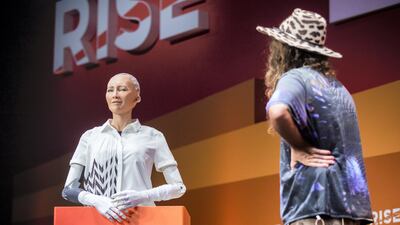When he made his debut in London, Eric, dubbed the "man without a soul", stood up, bowed and made a four-minute speech - one that was to transform the way we think and live forever. Less than a century later, fears are rife that artificial intelligence will render an entire workforce obsolete, make poor, low-skilled workers even poorer and force us all into a life of unemployment, with robots performing most, if not all, of our functions. A whole subculture of science fiction, art and fearmongering thrives on that notion. Omar bin Sultan Al Olama, the UAE's new Minister of State for Artificial Intelligence, thinks those fears are unfounded.
Speaking for the first time since his appointment, he said AI was not the force for evil many have built it to be, nor a premonition of a dystopian state of affairs where we are all controlled by robots, as some have warned. Instead, as part of the UAE's Strategy for Artificial Intelligence, it could offer lifesaving solutions to climate change, transportation, education and health and transform the infrastructure on which we all rely. The benefits, argues Mr Al Olama, far outweigh the negatives.
Nor is the UAE alone in its endeavours. Last month Saudi Arabia became the first country in the world to grant citizenship to a robot. The remarkably human-like Sophia graciously thanked her host nation and deflected concerns about a nightmare scenario. "You have been watching too many Hollywood movies," she joked.
So is there any basis for those fears? Certainly we are a long way from knowing the full impact of scientific developments and the vast technological leaps being taken today. Just as Eric’s creator cannot have known where the world would be less than 100 years later, we are still in the dark about how humankind and its humanoid counterpart might comfortably co-exist.
The important issue is to ensure any advancements in technology are done with humankind's best interests in mind and in a safe, controlled, governable manner. That is something that has been recognised by the UAE's government and implemented in its 2071 centennial masterplan. Like us, government officials cannot possibly see into a crystal ball - but they are putting measures in place to ensure working for society's good is at the forefront.

